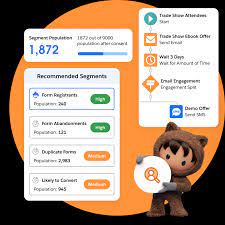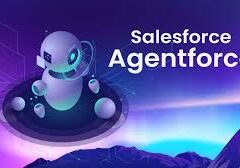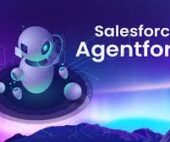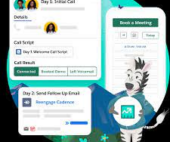HubSpot vs. Salesforce Marketing Cloud Growth: Which Marketing Automation Platform is Right For You?
EDITOR’S NOTE: Due to Marketing Cloud Growth being a new release, some of the SFMC data reflects Marketing Cloud Engagement as well.
Salesforce and HubSpot are both powerful customer relationship management (CRM) platforms, but they cater to different needs and business sizes. Salesforce, with its extensive customization and robust integrations, is better suited for growing enterprises, while HubSpot is better suited for small to medium-sized businesses that don’t require modular, ease of growth solutions.
Salesforce is a leading CRM platform, largely preferred for its extensive suite of features and functionalities. It offers high-level customization tools and advanced predictive analytics. Therefore, Salesforce is ideal for growing businesses, complex sales organizations, and large enterprises with deeper needs for configurability and scalability.
HubSpot vs. Salesforce: A High-Level Comparison Beyond Features
When organizations evaluate Customer Relationship Management (CRM) solutions, Salesforce and HubSpot frequently appear on their shortlists. While many online resources focus on feature-by-feature comparisons, this post takes a different approach—highlighting the key strategic differences between the two platforms.
Why a Features-First Approach Isn’t Enough
- 80% of online searches for HubSpot vs. Salesforce focus on feature comparisons (Ahrefs data).
- However, choosing the right CRM goes beyond just comparing functionalities.
- We recommend a structured CRM buying process for mid-sized and enterprise companies to ensure the best fit.
Editorial Note: We do not earn commissions from vendors covered on this site.
Vendor Overviews
Both Salesforce (founded 1999) and HubSpot (founded 2006) are leading CRM providers with strong market presence.
Products & Evolution
- Salesforce started as a Sales Force Automation (SFA) tool and expanded into a suite of business applications (Service Cloud, Tableau, Slack, etc.).
- HubSpot began as an inbound marketing platform and later added Sales, Service, Operations, and Commerce “Hubs.”
Marketing & Sales Dominance
- Both companies excel in marketing and sales outreach.
- HubSpot.com attracts ~11M monthly organic visitors; Salesforce.com gets ~8M (Ahrefs).
- Their sales teams are highly proactive—expect engagement if you sign up for a trial.
Key Differences to Consider
1. Scope & Complexity
- Salesforce excels in:
- Complex data models, advanced reporting, and deep customization.
- Compliance with HIPAA, FedRAMP, SOC 2, etc.
- Enterprise-grade scalability.
- HubSpot is ideal for:
- Startups and SMBs seeking an easy-to-use, integrated CRM.
- A higher floor (easier onboarding) but a lower ceiling (limited advanced customization).
“HubSpot has a higher floor; Salesforce has a significantly higher ceiling.” — Reddit User
2. Native vs. Integrated Marketing
- HubSpot offers native marketing automation, allowing seamless alignment between sales and marketing.
- Salesforce relies on integrations (Pardot, Marketing Cloud, HubSpot) for marketing automation, requiring more maintenance.
3. Consultant & App Ecosystems
- Salesforce has a larger ecosystem (global admins, developers, and 7,000+ apps on AppExchange).
- HubSpot’s App Marketplace (~1,700 apps) is more SMB-friendly, while Salesforce caters to enterprise needs.
4. Pricing Models
- HubSpot offers a freemium model (free for up to 5 users).
- Salesforce has no free tier, only time-limited trials.
- Pricing (as of last update):
- HubSpot Sales Hub Enterprise: $150/user/month
- Salesforce Sales Cloud Enterprise: $165/user/month
5. AI & Automation
- Salesforce Einstein AI includes AI agents (Agentforce) and emphasizes trust & compliance (Einstein Trust Layer).
- HubSpot’s Breeze AI focuses on productivity & insights, with tools for content, prospecting, and chatbots.
6. Business Process Automation
- Salesforce Flows offer greater complexity and flexibility for automation.
- HubSpot Workflows are simpler but more limited in advanced use cases.
7. User Experience (UX)
- Salesforce follows a traditional CRM layout (forms, fields, lists).
- HubSpot emphasizes activity-based engagement, making it ideal for sales outreach & ABM.
Final Considerations
- Companies using both platforms may consolidate into one.
- New adopters should assess long-term scalability, compliance, and ease of use.
- A structured CRM selection process is crucial—don’t rely solely on feature comparisons.
Which is right for you?
- Choose Salesforce if you need enterprise-scale customization, compliance, and deep automation.
- Choose HubSpot if you prioritize ease of use, integrated marketing, and a lower-cost entry point.
Before making a decision, evaluate your unique business needs—not just the platform differences.
Investing in flexible CRM software improves efficiency through task automation and creates an invaluable information resource for your employees.
Key Differences at a Glance
| Feature | HubSpot | Salesforce Marketing Cloud Growth |
|---|---|---|
| Ideal Use Case | Inbound marketing | Omnichannel customer journeys and outbound sales and marketing communications, and inbound marketing |
| Best for Small Business | X | |
| Best for Mid-Market | X | |
| Best for Enterprise | X | |
| Software Categories Ranked #1 in | 69 | 164 |
| 5 Star Customer Reviews | 8260 | 15055 |
| Positive Reviews of Ease of Use | 1095 | 4674 |
All Salesforce plans let you send 5,000 email marketing campaign messages daily — a generous allowance we haven’t seen from any other provider.
Here are some of the core capabilities of Salesforce Marketing Cloud:
- Write and design emails and landing pages with drag-drop functionality with ultimate personalization and customization options including dynamic content
- Personalize engagements through SMS and Push messages
- Automate campaigns for multiple channels
- List Segmentation: Create and automatically update contact lists and segments to optimize your email marketing efforts with rule-based, automatic, and dynamic options.
- Segment prospects and target online ads for the right audience
- Lead Tracking and Management: Segment, score, and convert potential customers using your unified data for a 360 degree view across all platforms
- Social Media Integration: Develop and automate social media marketing with platforms including Facebook, Google, Twitter (X) and more
- Personalize interaction for every prospect based on behavior and engagement levels
- Automated Workflows: Nurture leads and automate cross-channel operations with Salesforce Flow and its drag-and-drop visual tools
- Account-Based Marketing: Enhance marketing and sales efforts with user-friendly ABM tools including account planning, one-to-one, one-to-few, and one-to many account-based marketing models
- Form and Landing Page Builders: Use customizable templates and an intuitive drag-and-drop builder to create mobile-friendly designs that track, engage, and convert website visitors
- Marketing Analytics: Built-in reporting and dashboards that are customizable toturn customer data into deal-closing opportunities utilizing data visualization and artificial intelligence
- Offers predictive insights and recommendations
- Ads Management: Easy connector based ntegration with ad platforms like Google Ads, Instagram, and Facebook Ads for creating, running, and analyzing ad campaigns
Salesforce has powerful APIs and a vast array of third-party integrations that can efficiently handle diverse business processes and requirements. Additionally, the CRM offers various tools and options for ease of use and rapid scaling. It is a reliable cloud solution that can help businesses dive deeper into data-driven decision-making to optimize sales and operations.
Key Features in HubSpot Marketing Hub
From automation features for attracting, nurturing, and converting leads to blogging, SEO, and ad management, HubSpot has some value to offer marketers while lacking the robust features of Marketing Cloud. Here are some of the core features of this solution:
- List Segmentation: Create and automatically update contact lists
- Email Marketing: Design emails from scratch or use customizable templates
- Social Media Integration: Develop and automate social media marketing campaigns, engage with your audience, and monitor interactions
- Automated Workflows: Nurture leads and automate cross-channel operations with customizable workflows
- SEO and Content Strategy: Tools for optimizing content for search engines
- Lead Tracking and Management: Segment, score, and convert potential customers using your data
- Account-Based Marketing: Enhance marketing and sales efforts with ABM tools
- Form and Landing Page Builders: Use customizable templates and drag-and-drop builder to create designs that convert website visitors
- Marketing Analytics: Benefit from built-in reporting
- Ads Management: Integration with ad platforms like Google Ads and Facebook Ads for creating, managing, and analyzing ad campaigns
Customization and Flexibility
| HubSpot | Salesforce | |
| Customization | Custom objects, display information, basic API support, UI extensions, but with limitations | Customizable sales view, standard tabs, record types, page layouts, cust fields, help, content, and business processes with in-depth customization for your business |
| App integrations | HubSpot App Marketplace for app integrations | Extensive AppExchange library with more than 7000 apps |
Although HubSpot offers customization for display, layouts, and data models, there are limited options. The HubSpot App Marketplace also helps with swift app integrations. However, it can’t beat Salesforce in customization and flexibility.
With Salesforce, you get high-level customization features, allowing you to set up your data, websites, layouts, configurations, records, fields, interfaces, and several other options the way you want. The AppExchange platform offers ready-to-install third-party applications, building blocks, pre-built templates, scalable data solutions, guides, and other relevant resources for CRM processes.
Best for Pricing
Salesforce wins because its entry-level plan is more feature-packed than HubSpot’s and providees 5,000 free daily emails. Additionally, if you desire more features, the price jump from Starter to Pro isn’t as jarring as HubSpot’s jump from Starter to Professional.
Detailed Platform Comparison
1. Target Audience
HubSpot excels for:
- Startups and SMBs
- Companies focused on content/inbound marketing
- Teams with limited technical resources or capabilities
Salesforce Marketing Cloud Growth is built for:
- Global enterprises and growing SMBs
- Businesses running complex, multi-channel campaigns
- Organizations with dedicated marketing ops teams
- Organizations using inbound and outbound sales and marketing communications
“We chose Salesforce because HubSpot lacked the customization to meet our needs. Salesforce’s flexibility allowed us to create solutions that align with our business goals, ensuring seamless operations and the ability to scale as we grow.” -Paul Shin, VP of Marketing, B10 Energy
Salesforce’s extensive workflow and automation capabilities are flexible and precise. You can better manage teams, marketing campaign structures and much more. The platform’s Process Builder tools is superb. Although HubSpot’s visual editors are more user-friendly and you can code in JavaScript or Python, the platform doesn’t offer Salesforce’s advanced automation capabilities and east of use.
Getting started with HubSpot is easy since it requires minimal setup and configuration. Its plug-and-play approach makes integrating business-critical applications easier and consolidating marketing, sales, and service teams into one customer platform. The free version already has pre-configured settings, while the paid plans offer customization options.
Implementing Salesforce might not be as easy and quick. For optimal business outcomes, businesses must explore and configure all the customization features through CRM specialists. Therefore, it demands a more in-depth setup with a properly structured plan.
Key Takeaway: HubSpot is a better option for businesses looking for easier and faster implementation. However, if specific needs for highly customized CRM systems exist and expert resources are available, implementing Salesforce will be more effective in the long run.
2. Core Capabilities
HubSpot Strengths:
- Intuitive drag-and-drop editors
- All-in-one platform with built-in CRM
- Automated lead nurturing
- Social media and content management tools
SFMC Growth Advantages:
- Processes 10M+ interactions/hour
- Suitable for SMB, mid-market, and enterprise customers
- Advanced journey orchestration across 15+ channels
- Einstein AI predicts customer behavior (92% accuracy)
- Enterprise-grade security and compliance
- Automated workflow and lead nurturing
- Intuitive drag-and-drop editors and capabilities
- Interfaces with Sales and Service Clouds making it a well-roundedm customizable solution
- All-in-one platform built on Salesforce Core, the #1 CRM
- Designed with growth to Marketing Cloud Advanced in mind
- Builds emails, landing pages, and more
- Extensive customization, robust integrations, and expansive ecosystem available
This platform offers many marketing tools in one centralized place. They’re all part of two unique modules: Builders and Studios.
Salesforce comes out ahead in the category of reporting and anlytics thanks to its comprehensive toolset and visually appealing dashboards. The AI-powered Einstein tool and its predictive anlaytics and decision-making support add real value.
3. Implementation
| Factor | HubSpot | SFMC Growth |
|---|---|---|
| Setup Time | 36 days | 17 days |
| Training Needed | 10-20 hours | 15-20 hours |
HubSpot can build customized onboarding plans that are aligned with specific business goals. It extends technical and strategic guidance to help users at every step. Moreover, the HubSpot academy further helps with implementation strategies and continuous support through unlimited access to onboarding content, playlists, boot camps, and communities.
For smoother onboarding, Salesforce offers detailed product documentation, demos, and learning resources. Its extensive self-help portal and user community make it even easier to onboard new customers. The Trailhead training system is a go-to resource for exploring Salesforce and caters to learners at all levels and roles.
Key Takeaway: HubSpot offers a better user experience and ensures smoother onboarding. However, businesses willing to invest time and resources in understanding functionalities and enhancing their workforce skills with proper training can go with Salesforce.
4. AI & Automation
HubSpot AI:
- Generates email subject lines
- Creates content outlines
- Basic predictive scoring
Salesforce Einstein:
- Predicts CLV (92% accuracy)
- Recommends next-best actions
- Automated segmentation
- Forecasts campaign performance
- Advanced predictive scoring
- Generates content and summaries
- Exists in the connected Salesforce ecosystem
- Assists in building campaigns
- Integrates with Salesforce Agentforce
User Experience Reviews
- “I found Salesforce to be far more intuitive and supportive for the sales process than Hubspot” -Lauren Linzer, Director of Solutions, Tonic
- “We moved from HubSpot to Salesforce based on long term factors such as integrations and scalability. There were also short term issues such as dashboards, reporting, deal management, renewals, etc.” -Ian Hutchinson, VP of Sales DuploCloud
- “Consolidating the sales tech stack has saved our reps at least an hour a day since switching over from HubSpot.” -Matt Tait, CEO, Decimal
Cons of HubSpot
- Quickly gets expensive
- No flexibility in contracts
- Less powerful if not used as an all-in-one tool
- Email limitations
- No A/B testing in starter packages
- Limited reporting
- Technical support is pay as you go
Decision Guide
Choose HubSpot if you:
- Need marketing automation under $5k/month
- Focus on inbound/content marketing only
- Have limited technical staff and/or technical expertise
Choose SFMC Growth if you:
- Operate in 10+ countries
- Manage 1M+ customer profiles
- Require advanced predictive analytics
- Have enterprise IT resources
- Are implementing and utilizing artificial intelligence
- Utilize outbound marketing
- Want implementation that hits the ground running
- Seek a robust marketing platform
- Need a platform flexible for growth
- Prefer a more customizable CRM and well-rounded ecosystem of both native products and thousands of easily configured third-party apps
- Want to remain on one platform rather than constantly switching tools
- Plan to utilize autonomous agents working 24/7
- Need to advanced from spreadsheets to ready-to-use reports and dashboards as well as customizable reports and dashboards
- Seek more robust reporting and forecasting
- Utilize custom KPIs
The Bottom Line
Long-term scalability: Which platform better supports growth and complexity
HubSpot allows businesses to expand their operations with increasing users, marketing intact tiers, unlimited workflow automation, and other add-ons. These options are best for startups and small-scale businesses. However, it lacks the advanced customization, analytics, and reporting features required for complex business needs.
Salesforce is a top-tier CRM tool that adeptly caters to enterprises of all sizes. It can manage complex sales processes with intelligent automation and facilitate collaboration across multiple teams and platforms to boost productivity.
Key Takeaway: Salesforce supports high-level customization and analytics and can efficiently transform business operations. HubSpot is better for companies looking for easier and faster transitions and do not require deep-level customizations.
Salesforce wins in the area of integrations thanks to its extensive range of third-party applications and superior API interface. Its AppExchange platform offers more choices than any other CRM including HubSpot. The scale and depth of Salesforce’s offerings make it stand out among CRM providers.
While both platforms lead the marketing automation space, they serve fundamentally different needs. HubSpot delivers exceptional value for SMBs through its user-friendly interface but doesn’t have Salesforce’s extensive features. Salesforce Marketing Cloud Growth provides unmatched scale and sophistication for growing and global enterprises – but requires investment in time and resources.
It bears mention that Salesforce has unique products or clouds for sales, service, marketing, data ingestion, analytics, and more. HubSpot serves the needs of sales, service, and marketing from a single platform limiting the flexibility and customization available in the Salesforce ecosystem.
API access, developer resources, and extensibility
HubSpot APIs are designed for robust integrations and easy configurations. Users can also access detailed guides for CMS developments such as websites, blogs, and application creation. These developer resources elaborate on all steps in an easy-to-understand manner. However, there are limited customization and automation options.
Salesforce has a powerful developer ecosystem with extensive expansion capabilities. It offers guides and reference documents for API integrations, customizations, workflow automations, analytics and reporting, usage of low-code and no-code tools, third-party app sign-ins, and other critical development areas.
Key Takeaway: Salesforce is the clear winner in terms of API access, developer resources, and extensibility. It supports thousands of third-party integrations, making it suitable for various business use cases. HubSpot is better for enterprises looking for simple, ready-to-use configurations without complexities.
HubSpot is suitable for small to medium-sized businesses with its easy-to-use interface and limited features. On the other hand, Salesforce is a comprehensive solution for larger companies that require extensive customization and a vast array of tools. Marketing Cloud remains a top-tier platform for advanced marketing automation, particularly for enterprises with the resources to customize and integrate it.
The latest automation statistics show that 79% of companies use automation for marketing, while 49% leverage it for sales.
The 1B marketing software market offers solutions for every business size and need – the key is matching platform strengths to your organization’s requirements and resources.
Customers that switch from Hubspot to Marketing Cloud see:
- 29% ROI
- 33% More accurate AI
- 31% More revenue













